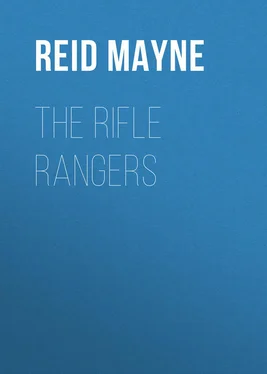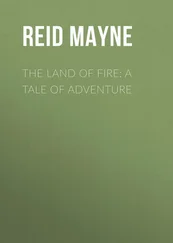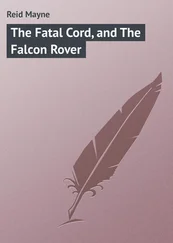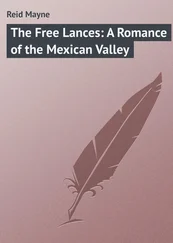Mayne Reid - The Rifle Rangers
Здесь есть возможность читать онлайн «Mayne Reid - The Rifle Rangers» — ознакомительный отрывок электронной книги совершенно бесплатно, а после прочтения отрывка купить полную версию. В некоторых случаях можно слушать аудио, скачать через торрент в формате fb2 и присутствует краткое содержание. Жанр: literature_19, foreign_antique, foreign_prose, на английском языке. Описание произведения, (предисловие) а так же отзывы посетителей доступны на портале библиотеки ЛибКат.
- Название:The Rifle Rangers
- Автор:
- Жанр:
- Год:неизвестен
- ISBN:нет данных
- Рейтинг книги:5 / 5. Голосов: 1
-
Избранное:Добавить в избранное
- Отзывы:
-
Ваша оценка:
- 100
- 1
- 2
- 3
- 4
- 5
The Rifle Rangers: краткое содержание, описание и аннотация
Предлагаем к чтению аннотацию, описание, краткое содержание или предисловие (зависит от того, что написал сам автор книги «The Rifle Rangers»). Если вы не нашли необходимую информацию о книге — напишите в комментариях, мы постараемся отыскать её.
The Rifle Rangers — читать онлайн ознакомительный отрывок
Ниже представлен текст книги, разбитый по страницам. Система сохранения места последней прочитанной страницы, позволяет с удобством читать онлайн бесплатно книгу «The Rifle Rangers», без необходимости каждый раз заново искать на чём Вы остановились. Поставьте закладку, и сможете в любой момент перейти на страницу, на которой закончили чтение.
Интервал:
Закладка:
From my feet a broad band of silver stretched away to the horizon, marking the meridian of the moon. This was broken by the line of coral reef, over which the surf curled and sparkled with a phosphoric brightness. The reef itself, running all round, seemed to gird the islet in a circle of fire. Here only were the waves in motion, as if pressed by some subaqueous and invisible power; for beyond, scarcely a breath stirred the sleeping sea. It lay smooth and silent, while a satellite sky seemed caved out in its azure depths.
On the south, a hundred ships were in the deep roadstead, a cable’s length from each other – their hulls, spars, and rigging magnified to gigantic proportions under the deceptive and tremulous moonbeam. They were motionless as if the sea had been frozen around them into a solid crystal. Their flags drooped listlessly down, trailing along the masts, or warped and twined around the halyards.
Up against the easy ascent extended the long rows of white tents, shining under the silvery moonbeam like pyramids of snow. In one a light was still gleaming through the canvas, where, perchance, some soldier sat up, wearily wiping his gun, or burnishing the brasses upon his belts.
Now and then dark forms – human and uniformed – passed to and fro from tent to tent, each returning from a visit to some regimental comrade. At equal distances round the camp others stood upright and motionless, the gleam of the musket showing the sentry on his silent post.
The plunge of an oar, as some boat was rowed out among the anchored ships – the ripple of the light breaker – at intervals the hail of a sentinel, “Who goes there?” – the low parley that followed – the chirp of the cicada in the dark jungle – or the scream of the sea-bird, scared by some submarine enemy from its watery rest – were the only sounds that disturbed the deep stillness of the night.
I continued my walk along the beach until I had reached that point of the island directly opposite to the mainland of Mexico. Here the chaparral grew thick and tangled, running down to the water’s edge, where it ended in a clump of mangroves. As no troops were encamped here, the islet had not been cleared at this point, and the jungle was dark and solitary.
The moon was now going down, and straggling shadows began to fall upon the water.
Certainly some one skulked into the bushes! – a rustling in the leaves – yes! some fellow who has strayed beyond the line of sentries and is afraid to return to camp. Ha! a boat! a skiff it is – a net and buoys! As I live, ’tis a Mexican craft! – who can have brought it here? Some fisherman from the coast of Tuspan. No, he would not venture; it must be —
A strange suspicion flashed across my mind, and I rushed through the mangrove thicket, where I had observed the object a moment before. I had not proceeded fifty yards when I saw the folly of this movement. I found myself in the midst of a labyrinth, dark and dismal, surrounded by a wall of leaves and brambles. The branches of the mangroves, rooted at their tops, barred up the path, and vines laced them together.
“If they be spies,” thought I, “I have taken the worst plan to catch them. I may as well go through now. I cannot be distant from the rear of the camp. Ugh! how dismal!”
I pushed on, climbing over fallen trunks, and twining myself through the viny cordage. The creepers clung to my neck – thorns penetrated my skin – the mezquite slapped me in the face, drawing blood. I laid my hand upon a pendent limb; a clammy object struggled under my touch, with a terrified yet spiteful violence, and, freeing itself, sprang over my shoulder, and scampered off among the fallen leaves. I felt its fetid breath as the cold scales brushed against my cheek. It was the hideous iguana.
A huge bat flapped its sail-like wings in my face, and returned again and again, breathing a mephitic odour that caused me to gasp. Twice I struck at it with my sword, cutting only the empty air. A third time my blade was caught in the trellis of parasites. It was horrible; I felt terrified to contend with such strange enemies.
At length, after a continued struggle, an opening appeared before me – a glade; I rushed to the welcome spot.
“What a relief!” I ejaculated, emerging from the leafy darkness. Suddenly I started back with a cry of horror; my limbs refused to act; the sword fell from my grasp, and I stood palsied and transfixed, as if by a bolt from heaven.
Before me, and not over three paces distant, the image of Death himself rose out of the earth, and stretched forth his skeleton arms to clutch me. It was no phantom. There was the white, naked skull, with its eyeless sockets, the long, flesh-less limbs, the open, serrated ribs, the long, jointed fingers of Death himself.
As my bewildered brain took in these objects I heard a noise in the bushes as of persons engaged in an angry struggle.
“Emile, Emile!” cried a female voice, “you shall not murder him – you shall not!”
“Off! off! – Marie, let me go!” was shouted in the rough accents of a man.
“Oh, no!” continued the female, “you shall not – no – no – no!”
“Curses on the woman! There, let me go now!”
There was a sound as of someone struck with violence – a scream – and at the same moment a human figure rushed out of the bushes, and, confronting me, exclaimed: “Ha! Monsieur le Capitaine! coup pour coup !” I heard no more; a heavy blow, descending upon my temples, deprived me of all power, and I fell senseless to the earth. When I returned to consciousness the first objects I saw were the huge brown whiskers of Lincoln, then Lincoln himself, then the pale face of the boy Jack; and, finally, the forms of several soldiers of my company. I saw that I was in my own tent and stretched upon my camp-bed.
“What? – howl – what’s the matter! – what’s this?” I said, raising my hands to the bandage of wet linen that bound my temples.
“Keep still, Cap’n,” said Bob, taking my hand from the fillet and placing it by my side.
“Och! by my sowl, he’s over it; thank the Lord for His goodness!” said Chane, an Irish soldier.
“Over what? what has happened to me?” I inquired.
“Och, Captin, yer honour, you’ve been nearly murthered, and all by thim Frinch scoundhrels; bad luck to their dirty frog-atin’ picthers!”
“Murdered! French scoundrels! Bob, what is it?”
“Why, yer see, Cap’n, ye’ve had a cut hyur over the head; and we think it’s them Frenchmen.”
“Oh! I remember now; a blow – but the Death? – the Death?”
I started up from the bed as the phantom of my night adventure returned to my imagination.
“The Death, Cap’n? – what do yer mean?” inquired Lincoln, holding me in his strong arms.
“Oh! the Cap’n manes the skilleton, maybe,” said Chane.
“What skeleton?” I demanded.
“Why, an owld skilleton the boys found in the chaparril, yer honner. They hung it to a three; and we found yer honner there, with the skilleton swinging over ye like a sign. Och! the Frinch bastes!”
I made no further inquiries about the “Death.”
“But where are the Frenchmen?” asked I, after a moment.
“Clane gone, yer honner,” replied Chane.
“Gone?”
“Yes, Cap’n; that’s so as he sez it,” answered Lincoln.
“Gone! What do you mean?” I inquired.
“Desarted, Cap’n.”
“How do you know that?”
“Because they ain’t here.”
“On the island?”
“Searched it all – every bush.”
“But who? which of the French?”
“Dubrosc and that ’ar boy that was always with him – both desarted.”
“You are sure they are missing?”
“Looked high and low, Cap’n. Gravenitz seed Dubrosc steal into the chaparril with his musket. Shortly afterwards we heern a shot, but thought nothin’ of it till this mornin’, when one of the sodgers foun’ a Spanish sombrary out thar; and Chane heern some’dy say the shot passed through Major Twing’s markey. Besides, we foun’ this butcher-knife where yer was lyin’.”
Читать дальшеИнтервал:
Закладка:
Похожие книги на «The Rifle Rangers»
Представляем Вашему вниманию похожие книги на «The Rifle Rangers» списком для выбора. Мы отобрали схожую по названию и смыслу литературу в надежде предоставить читателям больше вариантов отыскать новые, интересные, ещё непрочитанные произведения.
Обсуждение, отзывы о книге «The Rifle Rangers» и просто собственные мнения читателей. Оставьте ваши комментарии, напишите, что Вы думаете о произведении, его смысле или главных героях. Укажите что конкретно понравилось, а что нет, и почему Вы так считаете.












